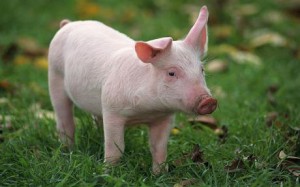 Recently the Bristol Post reported on a story about a stolen piglet from a local farm. This story is quite remarkable in the way it has been presented, and there are several questions that arise. Firstly, there are questions about how the piglet is viewed as property, and to whom the piglet belongs. Secondly there are issues with how the farm justifies their use of non-human animals.
Recently the Bristol Post reported on a story about a stolen piglet from a local farm. This story is quite remarkable in the way it has been presented, and there are several questions that arise. Firstly, there are questions about how the piglet is viewed as property, and to whom the piglet belongs. Secondly there are issues with how the farm justifies their use of non-human animals.
The issue of treating animals as property has generated a fair amount of discussion in the animal rights community. The basic concept is that non-human animals are sentient beings who are subjects of a life, therefore they have an interest in how they live their life. It is this interest that forms those intrinsic rights that we discuss in regard to animal rights, and they include not having to suffer necessarily at the hands of humanity. These interests are recognised where we consider that we do not need to use non-human animals, and where we seek alternatives to using them, and in this way we begin to respect the right to liberty of all living beings, a right we have taken away from them.
The issue with animals being property is that they are viewed as ‘things’, vessels to which we can exploit for our financial gain or entertainment. Their lives are considered as a means to an end, rather than as having any actual value to them. So when we move onto the story itself, we find a very sweet piglet has been taken from Windmill Farm; from a different perspective this could translate as the stolen pig was taken from Windmill Farm, after all it does not matter so much to the piglet who is doing the stealing. When we consider the piglet as property, we merely think of a potential preference for being around other pigs, and living in relative comfort within the confines of their own pen. So whilst the ‘theft’ itself could cause harm from being removed from familiar surrounds, there won’t necessarily be a change in circumstances for the piglet, at the end of the day their life will be stolen, and their body consumed, both the farm and ‘thief’ are seeking the same end for the piglet.
To justify this situation animal farmers often attempt to use reassuring language to assuage the doubts and concerns of consumers. In this particular story we are told the pigs are cared for, and they get to live with their brothers and sisters, they acknowledge the piglet would likely have been scared from being removed from their ‘home’, though the Bristol Post suggests luck is about to run out as the piglet is due to be slaughtered in November. Quite how the pig has been lucky up to now is not clear, unless we are comparing this with the ‘bad luck’ of ending up on a factory farm. At least in this case the farm is being honest that the piglets will end up as meat and are not just a curiosity for paying visitors. However, the story itself ends with the humane myth, where humane slaughter is lauded as a ‘good’ thing (of course there are better and worse ways to kill) yet a life has been stolen to consume flesh that we do not need to eat, and it is difficult to identify a basis for that in human kindness.
